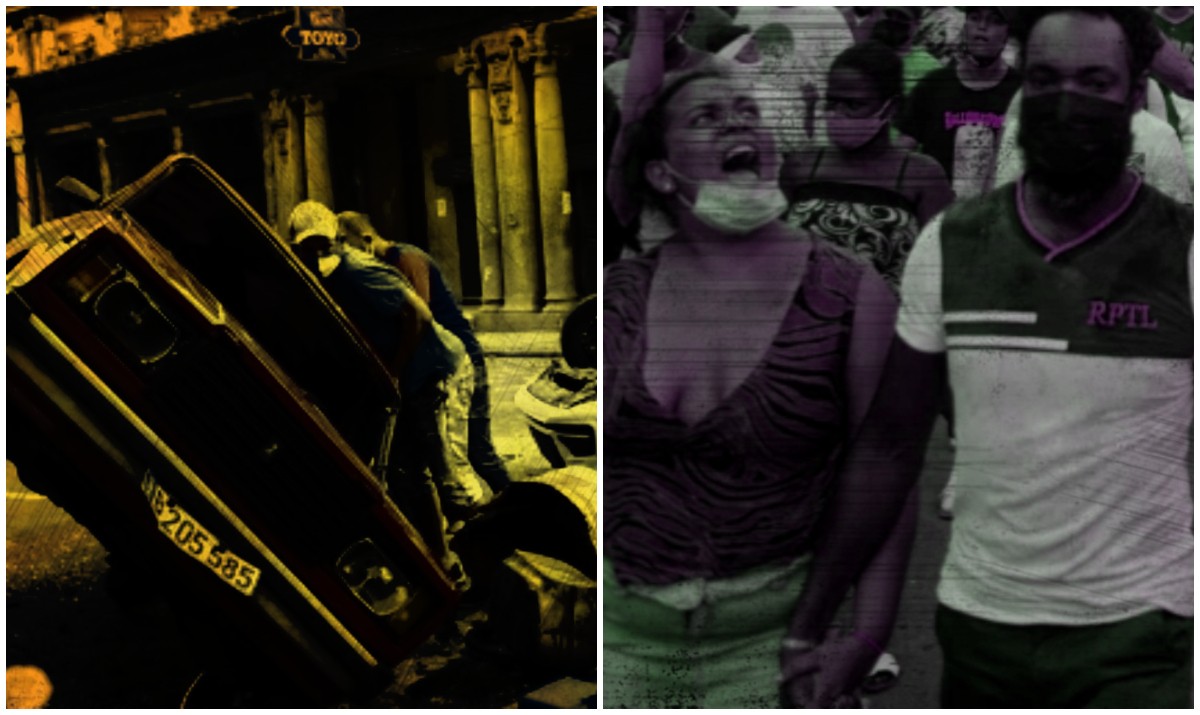Filed under: Caribbean, Featured, IGDcast, Interviews, Radio/Podcast

Podcast: Play in new window | Download
Subscribe: RSS
On this episode of the It’s Going Down podcast, we speak with an anarchist from Cuba and a Cuban-American anarchist living in Miami about the recent wave of protests which have swept the island over the last few weeks. While the demonstrations took everyone by surprise, our guests argue that they are historic in that they represent a ground swell of working-class anger that has manifested itself in demonstrations, clashes with the police, and looting; activity which has not taken place on the island for decades.
As Cuban anarchists wrote in a recent interview with CrimethInc.:
The demonstrations were a social explosion, without a doubt. The crisis and the tensions generated by precarity and the collapse of the health system brought it about. Now, it wasn’t a generalized explosion across all social strata. Beyond the areas where significant portions of the towns were involved, the poorest sectors of the population carried out the majority of the protests. The classist bias with which the state and its defenders have approached the issue is evident in the criticism of the protesters and their violence. Social inequality has been growing in Cuba for decades now, and the state has played with this dynamic to make alliances and secure loyalties. In this case, there’s been a clash between the most disadvantaged and most privileged sectors.
The protests began outside of Havana, in areas scourged by the supply shortage, excessive quarantines, and blackouts lasting up to 12 hours. Added to the accumulated social discontent from the present crisis produced by the intensification of the US embargo and government mismanagement—the peak of which was the implementation of a series of measures at the beginning of the year that led to increased inflation and the growth of the black market—this meant that in a municipality like San Antonio, hundreds of people poured into the streets to express their discontent. After the impact of that demonstration on social media, other protests occurred in areas suffering similar problems. Around 4 pm, the demonstrations spread nationally.
It was after Díaz-Canel’s communiqué, in which he called for his “revolutionaries” to confront the demonstrators, that harsh repression took place against peaceful marches, along with fierce clashes with the police.
All of the marches were spontaneous and ended up disoriented and easily dispersed. The Internet shutdown also reduced their visibility, while an immediate flood of (dis)information from the state proclaimed that the protests had ended in many places. Communication suffered a big hit during this whole process, since the only things getting through were the skewed news of the official media and lots of fake news spread through messaging apps. This contributed significantly to the reduction of tensions, but the return of the Internet and the publication of testimonials about repression haven’t permitted a complete return to normality. These days, the major organizing spaces are focused on the struggle to free those arrested—more than 500 people, according to some lists.
Cuban Anarchists on the Protests of July 11https://t.co/JbanZKoFo5
Two interviews with Cuban anarchists and a statement from the anarchist initiative Taller Libertario Alfredo López exploring the causes and implications of the wave of protests that broke out on July 11. pic.twitter.com/HsW7zUOWdd
— CrimethInc. (@crimethinc) July 22, 2021
Throughout out discussion we speak on the context of the revolt: both in terms of the US embargo, economic crisis, power shut-offs, and the COVID-19 pandemic, the class and racial makeup of the demonstrations, the impact of growing anger at police brutality and State authority, the historic division between the countryside and the urban centers, the role, size, and scope of reactionary, pro-US, and pro-intervention currents within the protests, repression of protesters, including anarchists and other anti-capitalists, and a discussion on how the Left has responded to the protests here in the United States.
We close by speaking about the small but growing anarchist movement in Cuba and how people can support autonomous and mutual aid projects there, as well as the importance of remembering Cuban anarchist history.
More Info: Support mutual aid programs here, support Cuban anarchists here, CrimethInc. interview with Cuban anarchists here





